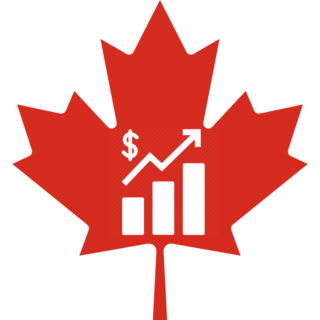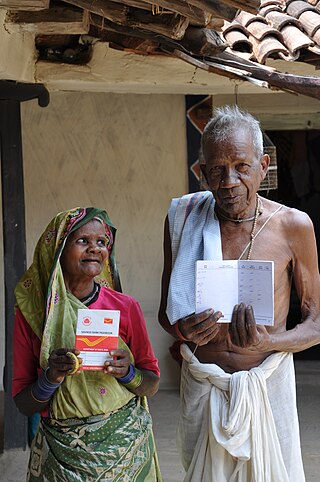Related Research Articles

The Great Society was a set of domestic programs in the United States launched by President Lyndon B. Johnson in 1964 and 1965. The term was first referenced during a 1964 speech by Johnson at Ohio University, then later formally presented at the University of Michigan, and came to represent his domestic agenda. The main goal was the total elimination of poverty and racial injustice.

In the United States, Medicaid is a government program that provides health insurance for adults and children with limited income and resources. The program is partially funded and primarily managed by state governments, which also have wide latitude in determining eligibility and benefits, but the federal government sets baseline standards for state Medicaid programs and provides a significant portion of their funding.
Supplemental Security Income (SSI) is a means-tested program that provides cash payments to disabled children, disabled adults, and individuals aged 65 or older who are citizens or nationals of the United States. SSI was created by the Social Security Amendments of 1972 and is incorporated in Title 16 of the Social Security Act. The program is administered by the Social Security Administration (SSA) and began operations in 1974.

Welfare spending is a type of government support intended to ensure that members of a society can meet basic human needs such as food and shelter. Social security may either be synonymous with welfare, or refer specifically to social insurance programs which provide support only to those who have previously contributed, as opposed to social assistance programs which provide support on the basis of need alone. The International Labour Organization defines social security as covering support for those in old age, support for the maintenance of children, medical treatment, parental and sick leave, unemployment and disability benefits, and support for sufferers of occupational injury.
The Fair Deal was a set of proposals put forward by U.S. President Harry S. Truman to Congress in 1945 and in his January 1949 State of the Union Address. More generally, the term characterizes the entire domestic agenda of the Truman administration, from 1945 to 1953. It offered new proposals to continue New Deal liberalism, but with a conservative coalition controlling Congress, only a few of its major initiatives became law and then only if they had considerable Republican Party support. As Richard Neustadt concludes, the most important proposals were aid to education, national health insurance, the Fair Employment Practices Commission, and repeal of the Taft–Hartley Act. They were all debated at length, then voted down. Nevertheless, enough smaller and less controversial items passed that liberals could claim some success.
Guaranteed minimum income (GMI), also called minimum income, is a social-welfare system that guarantees all citizens or families an income sufficient to live on, provided that certain eligibility conditions are met, typically: citizenship and that the person in question does not already receive a minimum level of income to live on.

In the United States, the Supplemental Nutrition Assistance Program (SNAP), formerly known as the Food Stamp Program, is a federal government program that provides food-purchasing assistance for low- and no-income persons to help them maintain adequate nutrition and health. It is a federal aid program administered by the U.S. Department of Agriculture (USDA) under the Food and Nutrition Service (FNS), though benefits are distributed by specific departments of U.S. states.
A means test is a determination of whether an individual or family is eligible for government benefits, assistance or welfare, based upon whether the individual or family possesses the means to do with less or none of that help.

Social programs in Canada include all Canadian government programs designed to give assistance to citizens outside of what the market provides. The Canadian social safety net includes a broad spectrum of programs, many of which are run by the provinces and territories. Canada also has a wide range of government transfer payments to individuals, which totaled $176.6 billion in 2009—this cost only includes social programs that administer funds to individuals; programs such as medicare and public education are additional costs.

In the United States, health insurance coverage is provided by several public and private sources. During 2019, the U.S. population overall was approximately 330 million, with 59 million people 65 years of age and over covered by the federal Medicare program. The 273 million non-institutionalized persons under age 65 either obtained their coverage from employer-based or non-employer based sources, or were uninsured. During the year 2019, 89% of the non-institutionalized population had health insurance coverage. Separately, approximately 12 million military personnel received coverage through the Veteran's Administration and Military Health System.

The United States federal earned income tax credit or earned income credit is a refundable tax credit for low- to moderate-income working individuals and couples, particularly those with children. The amount of EITC benefit depends on a recipient's income and number of children. Low-income adults with no children are eligible. For a person or couple to claim one or more persons as their qualifying child, requirements such as relationship, age, and shared residency must be met.

In the United States, poverty has both social and political implications. In 2020, there were 37.2 million people in poverty. Some of the many causes include income, inequality, inflation, unemployment, debt traps and poor education. The majority of adults living in poverty are employed and have at least a high school education. Although the US is a relatively wealthy country by international standards, it has a persistently high poverty rate compared to other developed countries due in part to a less generous welfare system.

The United States spends approximately $2.3 trillion on federal and state social programs including cash assistance, health insurance, food assistance, housing subsidies, energy and utilities subsidies, and education and childcare assistance. Similar benefits are sometimes provided by the private sector either through policy mandates or on a voluntary basis. Employer-sponsored health insurance is an example of this.
Disability benefits are a form of financial assistance or welfare designed to support disabled individuals who cannot work due to a chronic illness, disease or injury. Disability benefits are typically provided through various sources, including government programs, group disability insurance provided by employers or associations or private insurance policies typically purchased through a licensed insurance agent or broker, or directly from an insurance company.

China Foundation for Poverty Alleviation (CFPA) is a nongovernmental charitable organization in Beijing, China, registered under the Chinese Ministry of Civil Affairs in 1989 and professionally supervised by the State Council Leading Group Office of Poverty Alleviation and Development.

The National Social Assistance Programme (NSAP) is a Centrally Sponsored Scheme of the Government of India that provides financial assistance to the elderly, widows and persons with disabilities in the form of social pensions. The NSAP scheme only includes Below Poverty Line individuals as beneficiaries.
Welfare in California consists of federal welfare programs—which are often at least partially administered by state and county agencies—and several independent programs, which are usually administered by counties.
Community Care Fund is a charitable trust fund which collects five billion dollars from the government and the business sector respectively. The purpose is to provide a wide variety of financial support which are excluded in Comprehensive Social Security Assistance for the poor.
South Africa has one of the most extensive social welfare systems among developing countries in the world. In 2019, an estimated 18 million people received some form of social grant provided by the government.
The United States federal child tax credit (CTC) is a partially-refundable tax credit for parents with dependent children. It provided $2,000 in tax relief per qualifying child, with up to $1,400 of that refundable (subject to a refundability threshold, phase-in and phase-out). In 2021, following the passage of the American Rescue Plan Act of 2021, it was temporarily raised to $3,600 per child under the age of 6 and $3,000 per child between the ages of 6 and 17; it was also made fully-refundable and half was paid out as monthly benefits. This reverted back to the previous in 2022. The CTC is scheduled to revert to a $1,000 credit after 2025.
References
- ↑ "What we do". Cayman Island Government. Retrieved 11 April 2016.
- ↑ "The reality of Poverty In Cayman". Cayman Reporter. 5 August 2015. Archived from the original on 23 April 2016. Retrieved 11 April 2016.
{{cite news}}: CS1 maint: unfit URL (link)